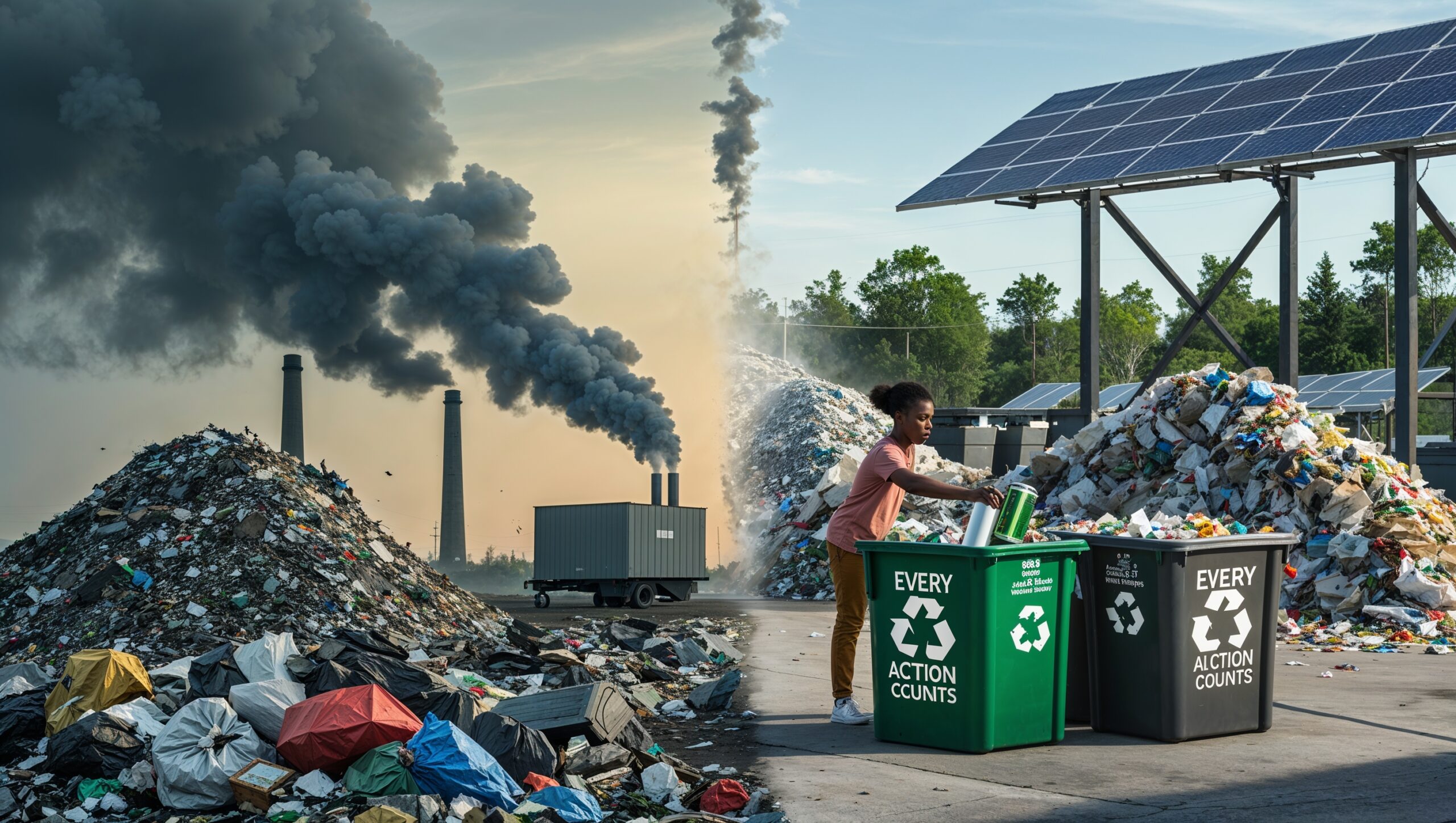When people think about fighting climate change, they often picture electric cars, solar panels, or planting trees. But one of the most accessible and underrated tools in the climate fight is something you can do every day: recycling.
In this article, we’ll explore how recycling directly impacts climate change, how it helps reduce emissions, and why small actions like sorting your waste can contribute to a global solution.
What Is Climate Change, and Why Does It Matter?
Climate change refers to long-term shifts in temperatures and weather patterns — largely driven by human activity, especially the burning of fossil fuels (coal, oil, natural gas).
The effects include:
- Rising global temperatures
- More frequent and severe natural disasters
- Ocean warming and acidification
- Melting glaciers and rising sea levels
- Habitat destruction and species extinction
Our waste system — including how we produce, use, and dispose of materials — plays a key role in both causing and solving this crisis.
How Recycling Helps Fight Climate Change
Recycling helps the environment in several ways, all of which connect back to carbon emissions and climate health.
1. Reduces the Need for Raw Material Extraction
Producing new materials from scratch often involves mining, deforestation, drilling, and processing — all of which release large amounts of CO₂.
✅ Recycling cuts the need for:
- Logging trees for paper
- Mining metal ores
- Extracting oil for plastic
- Harvesting virgin cotton or fabric
Less extraction = fewer emissions = healthier ecosystems.
2. Saves Energy in Manufacturing
Recycling uses far less energy than producing new items from raw materials.
🔋 For example:
- Recycling aluminum saves up to 95% of energy compared to making new aluminum
- Recycled plastic saves up to 70% of energy
- Paper recycling saves about 60% of the energy needed to create paper from trees
Lower energy use means less fossil fuel burning — and fewer greenhouse gases in the atmosphere.
3. Reduces Methane Emissions from Landfills
When organic waste (like food or paper) breaks down in landfills without oxygen, it produces methane — a greenhouse gas that’s more than 25 times more potent than CO₂.
✅ Recycling paper, cardboard, and food waste keeps methane-producing materials out of landfills.
Even better? Composting organic waste instead of trashing it turns it into healthy soil rather than harmful gas.
4. Lowers Carbon Footprint of Everyday Products
Every product has a carbon footprint — the total amount of emissions it generates from creation to disposal.
Recycling helps shrink that footprint by:
- Extending the life of materials
- Avoiding emissions from incineration or landfilling
- Reducing the need to transport heavy raw materials long distances
It’s a simple way to reduce your personal and household climate impact.
How Much Impact Can One Person Have?
It may not seem like much, but small actions add up — especially when multiplied by millions.
🌎 If every person in the U.S. recycled just one aluminum can per day, we could:
- Save energy to power thousands of homes
- Prevent millions of pounds of CO₂ emissions
- Reduce the need to mine new bauxite (aluminum ore)
Every item recycled is a choice against waste, pollution, and climate inaction.
What to Prioritize for Climate Impact
Want to maximize your recycling impact? Focus on materials with the highest energy and emissions savings:
♻️ Aluminum – Cans, foil trays
♻️ Plastic #1 and #2 – Bottles, containers
♻️ Paper and Cardboard – Clean, dry, flattened
♻️ Electronics – Contains metals and batteries
♻️ Organic Waste – Compost to avoid methane
And of course — always reduce and reuse before recycling.
Don’t Forget: Recycling Is Just One Piece of the Puzzle
While recycling is essential, it works best as part of a larger strategy:
✅ Combine with:
- Reducing unnecessary consumption
- Choosing sustainable packaging
- Supporting circular economy products
- Using clean energy at home and work
- Educating others about proper recycling practices
Recycling isn’t the only solution — but it’s an accessible one that nearly everyone can do.
A Simple Habit With Global Effects
You don’t need to be a scientist, politician, or activist to take climate action. Every bottle you rinse, every can you flatten, every cardboard box you recycle is a tiny act of climate leadership.
It’s your way of saying:
“I choose a cleaner, cooler, and more sustainable world.”
